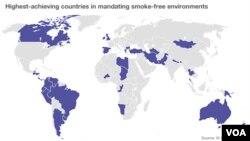GENEVA —
The World Health Organization reports tobacco control measures can avert millions of deaths. A new WHO Report on the Global Tobacco Epidemic 2013 shows hundreds of millions of non-smokers are less likely to start smoking because of national anti-tobacco campaigns that are reaching three billion people worldwide.
WHO estimates some three billion people globally now are covered by at least one life-saving measure to limit tobacco use. In 2008, WHO identified six tobacco control measures that are the most effective in reducing tobacco-use.
In this year’s report on the Global Tobacco Epidemic, WHO focuses on bans on tobacco advertising, promotion and sponsorship, which it considers one of the most powerful measures to control tobacco use. It says the number of people covered by these bans has increased by almost 400 million people living mainly in low-and middle-income countries.
The Director of WHO’s Prevention of Non-communicable Diseases department, Douglas Betcher, said this shows the tobacco industry’s bullying tactics are not working as well as before.
“Doors thank goodness are closing on the industry. So, it means that their bottom line is to sell," he said. "Their bottom line is to get more people hooked and younger people hooked, and they will kill more people. That is their bottom line. The industry being underhanded…will stop at nothing to get their messages out. So, it’s important that countries ban all forms of advertising, promotion and sponsorship.”
As of today, WHO says 24 countries with 694 million people have introduced complete bans and 100 more countries are close to a complete ban. However, it notes 67 countries do not ban tobacco advertising, promotion and sponsorship activities.
WHO reports tobacco is the leading preventable cause of death worldwide It says it kills six million people every year, more than tuberculosis, HIV and malaria combined. It says tobacco can cause cancer, cardiovascular disease, diabetes and chronic respiratory diseases.
Source: WHO
If current trends continue, WHO warns the number of smoking-related deaths will rise to eight million a year by 2030. Betcher said studies show that WHO’s six-evidence-based tobacco control measures, known as “MPOWER,” are the most effective in reducing tobacco use.
“The first one is protect people from tobacco smoke-what is measured is complete bans in smoking in all public places, work places, no designated smoking areas," he said. "Always offering help to quit tobacco use…offering free national quit lines to advise people on how to quit and to link that to the health system, to provide also medication support--essential drugs like nicotine-replacement therapy to help people to quit. Warning people about the dangers of tobacco use. Prominent hard-hitting clear messages with pictorial warnings over 50 percent on packages.”
Betcher said 41 countries have adopted at least one of the six MPOWER measures as of 2010. He said an estimated 7.4 million lives have been saved during these three years in those countries that have adopted and implemented one of those measures at the highest level.
Case studies show countries including Panama, China, Thailand, Madagascar, Australia, Uruguay, Ghana and Turkey are succeeding in cutting tobacco use. WHO says it does not take money for countries to get their populations to quit this deadly habit. It takes political will.
WHO estimates some three billion people globally now are covered by at least one life-saving measure to limit tobacco use. In 2008, WHO identified six tobacco control measures that are the most effective in reducing tobacco-use.
In this year’s report on the Global Tobacco Epidemic, WHO focuses on bans on tobacco advertising, promotion and sponsorship, which it considers one of the most powerful measures to control tobacco use. It says the number of people covered by these bans has increased by almost 400 million people living mainly in low-and middle-income countries.
The Director of WHO’s Prevention of Non-communicable Diseases department, Douglas Betcher, said this shows the tobacco industry’s bullying tactics are not working as well as before.
“Doors thank goodness are closing on the industry. So, it means that their bottom line is to sell," he said. "Their bottom line is to get more people hooked and younger people hooked, and they will kill more people. That is their bottom line. The industry being underhanded…will stop at nothing to get their messages out. So, it’s important that countries ban all forms of advertising, promotion and sponsorship.”
As of today, WHO says 24 countries with 694 million people have introduced complete bans and 100 more countries are close to a complete ban. However, it notes 67 countries do not ban tobacco advertising, promotion and sponsorship activities.
WHO reports tobacco is the leading preventable cause of death worldwide It says it kills six million people every year, more than tuberculosis, HIV and malaria combined. It says tobacco can cause cancer, cardiovascular disease, diabetes and chronic respiratory diseases.
The components of MPOWER
The components of MPOWER- Monitor tobacco use and prevention policies
- Protect people from tobacco smoke
- Offer help to quit tobacco use
- Warn about the dangers of tobacco
- Enforce bans on tobacco advertising, promotion and sponsorship
- Raise taxes on tobacco
Source: WHO
“The first one is protect people from tobacco smoke-what is measured is complete bans in smoking in all public places, work places, no designated smoking areas," he said. "Always offering help to quit tobacco use…offering free national quit lines to advise people on how to quit and to link that to the health system, to provide also medication support--essential drugs like nicotine-replacement therapy to help people to quit. Warning people about the dangers of tobacco use. Prominent hard-hitting clear messages with pictorial warnings over 50 percent on packages.”
Betcher said 41 countries have adopted at least one of the six MPOWER measures as of 2010. He said an estimated 7.4 million lives have been saved during these three years in those countries that have adopted and implemented one of those measures at the highest level.
Case studies show countries including Panama, China, Thailand, Madagascar, Australia, Uruguay, Ghana and Turkey are succeeding in cutting tobacco use. WHO says it does not take money for countries to get their populations to quit this deadly habit. It takes political will.








